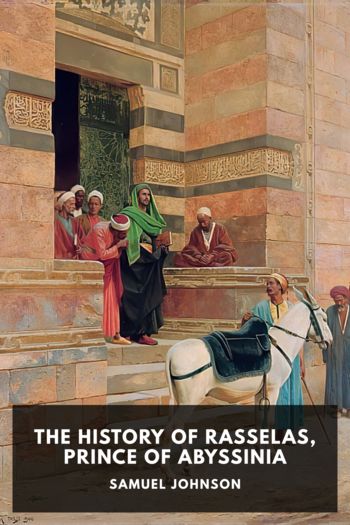The History of Rasselas, Prince of Abyssinia - Samuel Johnson (best novel books to read .TXT) 📗

- Author: Samuel Johnson
Book online «The History of Rasselas, Prince of Abyssinia - Samuel Johnson (best novel books to read .TXT) 📗». Author Samuel Johnson
“How,” said Rasselas, “can the Arab, whom you represented as a man of more than common accomplishments, take any pleasure in his seraglio, when it is filled only with women like these? Are they exquisitely beautiful?”
“They do not,” said Pekuah, “want that unaffecting and ignoble beauty which may subsist without sprightliness or sublimity, without energy of thought or dignity of virtue. But to a man like the Arab such beauty was only a flower casually plucked and carelessly thrown away. Whatever pleasures he might find among them, they were not those of friendship or society. When they were playing about him he looked on them with inattentive superiority; when they vied for his regard he sometimes turned away disgusted. As they had no knowledge, their talk could take nothing from the tediousness of life; as they had no choice, their fondness, or appearance of fondness, excited in him neither pride nor gratitude. He was not exalted in his own esteem by the smiles of a woman who saw no other man, nor was much obliged by that regard of which he could never know the sincerity, and which he might often perceive to be exerted not so much to delight him as to pain a rival. That which he gave, and they received, as love, was only a careless distribution of superfluous time, such love as man can bestow upon that which he despises, such as has neither hope nor fear, neither joy nor sorrow.”
“You have reason, lady, to think yourself happy,” said Imlac, “that you have been thus easily dismissed. How could a mind, hungry for knowledge, be willing, in an intellectual famine, to lose such a banquet as Pekuah’s conversation?”
“I am inclined to believe,” answered Pekuah, “that he was for some time in suspense; for, notwithstanding his promise, whenever I proposed to despatch a messenger to Cairo he found some excuse for delay. While I was detained in his house he made many incursions into the neighbouring countries, and perhaps he would have refused to discharge me had his plunder been equal to his wishes. He returned always courteous, related his adventures, delighted to hear my observations, and endeavoured to advance my acquaintance with the stars. When I importuned him to send away my letters, he soothed me with professions of honour and sincerity; and when I could be no longer decently denied, put his troop again in motion, and left me to govern in his absence. I was much afflicted by this studied procrastination, and was sometimes afraid that I should be forgotten; that you would leave Cairo, and I must end my days in an island of the Nile.
“I grew at last hopeless and dejected, and cared so little to entertain him, that he for a while more frequently talked with my maids. That he should fall in love with them or with me, might have been equally fatal, and I was not much pleased with the growing friendship. My anxiety was not long, for, as I recovered some degree of cheerfulness, he returned to me, and I could not forbear to despise my former uneasiness.
“He still delayed to send for my ransom, and would perhaps never have determined had not your agent found his way to him. The gold, which he would not fetch, he could not reject when it was offered. He hastened to prepare for our journey hither, like a man delivered from the pain of an intestine conflict. I took leave of my companions in the house, who dismissed me with cold indifference.”
Nekayah having heard her favourite’s relation, rose and embraced her, and Rasselas gave her a hundred ounces of gold, which she presented to the Arab for the fifty that were promised.
XL The History of a Man of LearningThey returned to Cairo, and were so well pleased at finding themselves together that none of them went much abroad. The Prince began to love learning, and one day declared to Imlac that he intended to devote himself to science and pass the rest of his days in literary solitude.
“Before you make your final choice,” answered Imlac, “you ought to examine its hazards, and converse with some of those who are grown old in the company of themselves. I have just left the observatory of one of the most learned astronomers in the world, who has spent forty years in unwearied attention to the motion and appearances of the celestial bodies, and has drawn out his soul in endless calculations. He admits a few friends once a month to hear his deductions and enjoy his discoveries. I was introduced as a man of knowledge worthy of his notice. Men of various ideas and fluent conversation are commonly welcome to those whose thoughts have been long fixed upon a single point, and who find the images of other things stealing away. I delighted him with my remarks. He smiled at the narrative of my travels, and was glad to forget the constellations and descend for a moment into the lower world.
“On the next day of vacation I renewed my visit, and was so fortunate as to please him again. He relaxed from that time the severity of his rule, and permitted me to enter at my own choice. I found him always busy, and always glad to be relieved. As each knew much which the other was desirous of learning, we exchanged our notions with great delight. I perceived that I had every day





Comments (0)